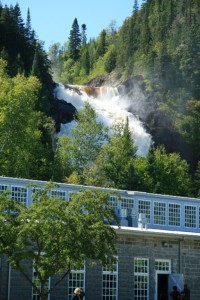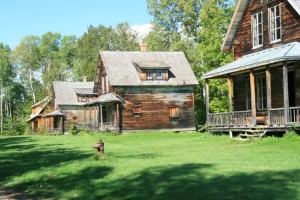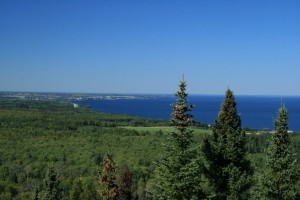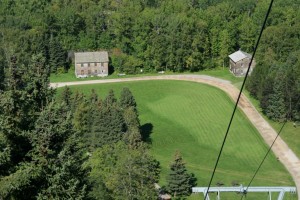Train buffs, as well as visitors just looking for a good time, will enjoy a trip on the Verde Canyon Train. Located in the hills of Arizona, south of the Grand Canyon, the train takes a leisurely 32 kilometre trip from Clarksdale to Perkinsville and back.
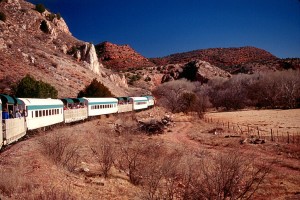
Clarkdale arose in 1911as the smelter town for the United Verde Copper Company that got its ore from the mines at nearby Jerome on the slopes of Mingus Mountain. To take the ore to markets investors built a railway from Clarkdale through the narrow canyon of the Verde River. As usually happens, the mine eventually closed, and also the smelter. Clarkdale began to die.
Now Clarkdale is kept alive by the Verde Canyon Train. The scenic train trip draws visitors from all over the world. And it’s no wonder. Although it’s a short trip, only a 64 kilometre round trip it’s packed with beauty. Once you leave the scars of the slag piles at the edge of town, it’s a pleasant rural ride. The greenish Verde River flows across the open valley floor to rush into the narrow confines of the canyon. Depending upon the angle of the sun, the walls of the canyon blaze in reds, pinks and golds. Along the river the green cottonwoods and other shrubs are resplendent with their backdrop of colourful cliffs.
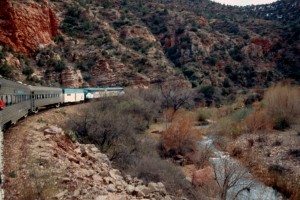
The canyon is a well established area for seeing wildlife, especially birds. In the arid country around the canyon, wetlands are enjoyed by birds and animals alike. The winter months of December to March are prime bald and golden eagle months. The train crew is quick to point out the locations of these big birds roosting in the trees or higher up on the cliff sides.
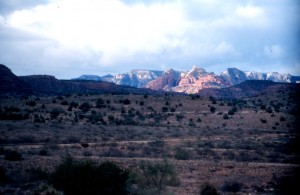
The railroad was built with great difficulty, requiring a 207 metre tunnel to cut into the cliff where the river allowed no room for the track. Many side streams required culverts or short trestles. It’s the proximity to the river that really adds to the enjoyment of the trip. Dashing in places, and tranquil in others, the river is the source of water for the plants that grow along it, and for the many birds that flock to the brush and trees for hiding places and for their nests. Deer and antelope come down from the hills for a drink. They are not much frightened by the train and are often seen by the passengers.
It’s probably best if you sit on the right side of the train as you leave the station. This will give you views across the river to the cliffs beyond, and some very spectacular views of the Sedona red rocks to the east. It’s also easier to spot the bald eagles.
The engines switch ends of the train at the old community of Perkinsville. If you take a
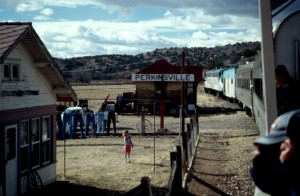
jeep you can visit Perkinsville by taking a rough road out of Jerome. The train is the best way to see the inner part of the Verde Canyon.
There are several different types of train trips and you might enjoy the Grape Train Escape on an evening trip into the canyon.
It is unfortunate that this tour never uses steam locomotives. It’s a perfect location for the wail of the steam engine, and the chuff chuff of a hard working locomotive as it climbs along the river. Apart from that, this is a great trip, as attested to by the thousands of passengers a year that enjoy a relaxing 4 hours doing nothing but looking and savouring nature in the wild.
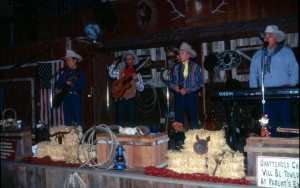
After a terrific day why not stop at Cottonwood and visit the Blazin’n M Chuckwagon Ranch for a scrumptious supper followed by the best live Western music in town.
Happy RVing !
This is one of the tours in ‘Cactus and Canyons’ a Touring North America guide book)
For more than four decades James Stoness has travelled the roads of North America, photographing and writing about what he has seen. His travel articles and beautiful pictures have been published in several magazines and newspapers. He is also the author of five western novels. Visit his website at: www.stonesstravelguides.com
